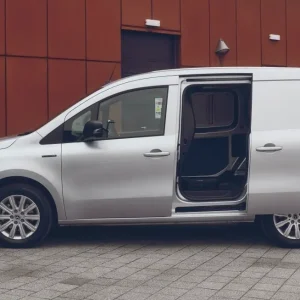Despite broader economic wobbles, and a lingering sense of commercial uncertainty, demand for vans is on the rise, and with it the market for rental vehicles.
The sectors where these light commercials operate are many and varied – from straightforward panel van daily rentals to more specialist applications, which once might have been seen as the preserve of low-volume specialists outright purchasing modified vehicles.
“Our customers are hugely varied, but the vast majority are SMEs,” says Jonathan pearce, head of marketing for rental giant Northgate.
“Our biggest sector is construction, closely followed by transportation and the storage sector. We work a lot with couriers and delivery companies,” he says, adding that there is a healthy trade from manufacturers and wholesalers too.
Danny Glynn, managing director of Enterprise Flex-E-rent, thinks his is a three-pronged market. His customers have “a requirement for a set period of time but don’t want the administrative burden and cost associated with owning vehicles, [or are] business and organisations with predictable, seasonal trends, such as councils, andbusinesses with very short-term or unpredictable requirements that might include replacement vehicles to cover downtime”.
According to a spokesman for the vehicle rental and leasing trade body the BVrla, its members are responsible for one-in-six vans on Britain’s roads.
“Van rental is popular in every economic climate, providing companies with the flexibility to downsize in a recession or upsize at short notice as conditions improve,” says a spokesman.
Everyone interviewed for this article says that van rental is attracting a lot of conquest users. Northgate’s pearce claims that over the past year and a half his firm has been busy with first-time renters, with some 50% of them having “historically purchased” their own vehicles. He reckons one reason for this is that if a client decides to switch from, say a car-derived vehicle to a full panel van, this can be done with little more than a phone call, something that wouldn’t apply to vehicles wholly owned or leased in three-year contract hire agreements.
The BVrla spokesman says that a move to downsize fleets from HGVs, which need hard-to- source specialist drivers, is another factor that has helped rental operators. They also seem to be willing to stock more specialist vehicles, although Northgate has eschewed refrigerated vans. “They require a lot of upkeep and specialist equipment when they go wrong,” explains pearce. However, he adds that the company is reviewing this position.
In the meantime, it does brisk business with highway maintenance vehicles equipped with tower racking, the sort of vehicles you see being used to deposit traffic cones on motorways. Welfare units – vans with tables, seating, toilets and hot water – are also in demand from construction clients.
Glynn of Enterprise Flex-E- rent concurs: “an example of this would be the ‘Utility Spec’ vehicle, which is becoming more common on rental fleets and comes with beacons, tow bar and ‘chapter 8’ (reflective chevron) livery pre-fitted.”
Glynn reckons the more specialised rental vehicles have driven up demand for ‘flexi-rental’ packages that undercut daily rental costs but don’t lock in clients to long-term hire agreements.
Europcar van specialist Stuart russell says that van operators of all stripes have been keen
“to sweat their assets” after the 2008 economic crash, and in the past four to six months therehas been a big vehicle-renewal push. His firm has seen a 39% rise in rental days across the board, with most of this going to flexi-lease contracts. “leasing companies are coming to us. if you have a three-month lead time before your vehicles hit the ground, you need to fill the gap,” he says.
Internet sales
The vast growth of internet sales, leading to an explosion in home- delivery operations, many hiring in owner-drivers, has meant Europcar and its rivals renting vans to small traders who will rack up “spaceship” mileages. russell is used to demand spikes after bank holidays and leading up to occasions such as Mother’s Day. Europcar recently supplied 266 flexi-lease crew vans to Network rail on a year’s use basis. previously, russell would have expected these to have been contract hired or bought outright, and wonders if uncertainty about the economy is making the idea of paying a bit more for quickly disposable vehicles a factor for some operators.
Russell thinks operators, such as local authorities might increasingly hire in vehicles on a per hour basis for specific jobs, now that tablet and smartphone technology is making this far simpler, and says he’s seen a growing market for rental vans used for car share-style vehicle- hire apps, where vehicles are left in car parks and on streets, and can be accessed by mobile phone with bar codes, which can be read by windscreen-mounted transponders that automatically unlock the vehicles.
“In 10 years the market will be a completely different place,” says russell, “driven by technology that’s emerging now.”
Europcar has seen a 39% rise in rental days in the past four to six months





